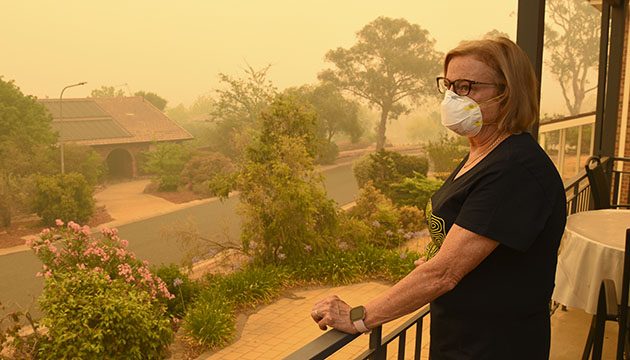Submitted by PeaceHealth
Here are some steps you can take to protect your health when the air quality is poor.
When wildfires create smoky conditions, it’s important to take extra steps to protect your health. Wildfire smoke can irritate your eyes, nose, throat and lungs. It can make it hard to breathe and cause you to cough or wheeze.
Children, pregnant women and people with asthma, chronic obstructive pulmonary disease (COPD) or heart disease especially need to reduce their exposure to wildfire smoke.
How to protect your health
There are several things you can do to keep the smoke out and protect your health.
- Pay attention to air quality. As air quality worsens, the possibility of negative health effects increases. You can track air quality in your area through websites such Washington Smoke Blog and AirNow.
- Stay indoors and keep doors and windows closed. You can use wet cloths to plug up any cracks where smoke may seep through. If the smoke is especially bad or if you have a large home, choose one room in your home to set up as a clean room.
- Keep the indoor air clean. Use a portable air cleaner to clean the air inside. Run an air conditioner, if you have one, but keep the fresh air intake closed. Use HEPA or MERV-13 filters to trap pollutants. You can also make your own DIY box fan air cleaner by following these steps from the Washington Department of Ecology.
- Do not add to indoor pollution. Don’t use anything that creates additional smoke such as candles, fireplaces or cigarettes. Refrain from activities such as vacuuming that can stir up particles in your home.
- Stay hydrated and take measures to soothe any symptoms. Drinking water can help your body trap or fend off the particles and other irritants you’re breathing in. Artificial tears or saline can also be used to moisten your eyes, if you need it.
- If you must go out, wear the right mask. Cloth masks and face coverings recommended for protection against COVID-19 do not protect against wildfire smoke.Look for masks (respirators) marked NIOSH with N95 or P100. The Environmental Protection Agency has additional information on how to use them correctly.
- Protect yourself when driving. When the air is thick with smoke, it may be best to avoid driving due to low visibility. If you do need to travel, keep your vehicle windows closed, turn on the air conditioner and use the recirculate function to lower particle levels in the vehicle. Be sure to vent the air occasionally, however, as these actions can cause carbon dioxide levels to build and make you sleepy.
- Watch out for your pets. Dogs, cats and other animals can also be affected by wildfire smoke. Learn how to protect them.
Wildfire smoke and COVID-19
Wildfire smoke can irritate your lungs and affect your immune system making you more prone to lung infections, including the virus that causes COVID-19. People who currently have or have had the coronavirus may be at increased risk of health effects due to their lung and/or heart function being compromised by the virus.
Some symptoms, such as dry cough, sore throat and difficulty breathing can be caused by both wildfire smoke and COVID-19. If you have concerns, you can use an online symptom checker or contact your doctor for an assessment.
If you develop severe symptoms, such as difficulty breathing or chest pain, call 911 immediately.
Have a plan in case you need to evacuate
Wildfire smoke in the air can mean a wildfire is close by. Be sure to pay attention to local updates from officials and new outlets so you know what’s happening around you. The Centers for Disease Control and Prevention has a list of steps you can take to prepare your home and your family.




































